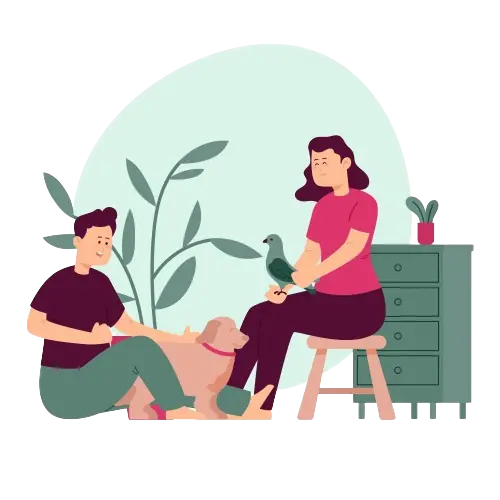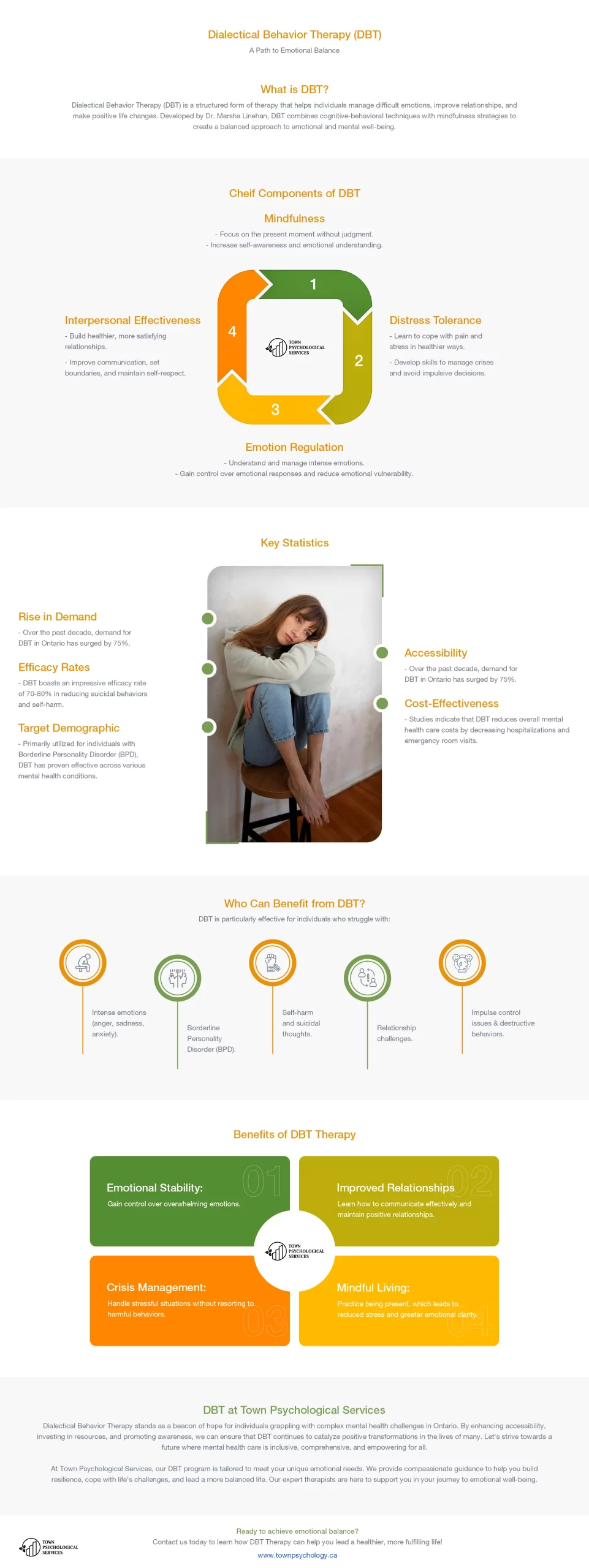Dialectical Behavior Therapy
Struggling with overwhelming emotions? Our DBT therapists at Town Psychological Services can help you regain control, manage distress, and create healthier relationships. Our highly trained Psychologists and Registered Psychotherapists specialize in Dialectical Behaviour Therapy (DBT), a proven, life-changing approach to mental wellness. Start your journey toward emotional balance today.
What Exactly is Dialectical Behavior Therapy (DBT)?
Developed by Dr. Marsha Linehan, DBT is a form of cognitive-behavioral therapy with mindfulness practices to help individuals cope with intense emotions, improve relationships, and achieve a balanced life.
Dialectical Behaviour Therapy (DBT) is an evidence-based treatment designed to help individuals cope with intense, unpredictable, and distressing emotions. DBT helps people obtain a life worth living, learn important life skills, and develop a greater sense of self-control.
DBT is influenced by the philosophy of dialectics, which means the balancing of opposites. It aims to strike a balance between accepting aspects of one’s current experience, while simultaneously changing what might not be working for them.

Dialectical Behavior Therapy draws upon acceptance-based principles from Zen Buddhist traditions and change-based principles from behaviour therapy. DBT is a type of therapy that can help people improve their emotional regulation, distress tolerance, interpersonal effectiveness, and mindfulness. It is often used to treat people with Borderline Personality Disorder (BPD), but it can also be helpful for people with other mental health conditions, such as mood disorders, eating disorders, anger management issues, and substance use problems.
Who Needs Dialectical Behaviour Therapy (DBT)?
Dialectical Behavior Therapy (DBT) is a versatile and effective therapeutic approach that can benefit a wide range of individuals experiencing various mental health challenges. While originally developed to treat Borderline Personality Disorder (BPD), DBT has since been adapted to address the needs of diverse populations.
Here are some examples of who may benefit from Dialectical Behavior Therapy:
1. Individuals with Borderline Personality Disorder (BPD): Initially developed to specifically target the symptoms and behaviors associated with BPD, such as unstable emotions, impulsivity, and difficulty in relationships. It remains a highly recommended treatment for individuals diagnosed with BPD.
2. People with Mood Disorders: Dialectical Behavior Therapy has shown efficacy in treating mood disorders such as depression and bipolar disorder. Its focus on emotion regulation and mindfulness techniques can help individuals better manage mood swings, alleviate symptoms of depression, and prevent relapse.
3. Struggling with Anxiety Disorders: Dialectical Behavior Therapy incorporates skills training modules that address anxiety-related symptoms, including distress tolerance and emotion regulation. Individuals with generalized anxiety disorder, panic disorder, social anxiety disorder, and other anxiety disorders can benefit from learning these coping skills.
4. Trauma-Related Disorders: Several individuals with histories of trauma, including Post-traumatic Stress Disorder (PTSD) and complex trauma, experience difficulties regulating emotions and navigating interpersonal relationships. It emphasis on safety, validation, and coping strategies can be invaluable in their healing journey.
5. Substance Use Disorders: DBT has been adapted to address the complex needs of individuals struggling with substance abuse and addiction. By teaching coping skills, enhancing motivation for change, and addressing underlying emotional vulnerabilities, it can support individuals in achieving and maintaining sobriety.
6. Eating Disorders: Dialectical Behavior Therapy skills, particularly those related to emotion regulation and distress tolerance, can be beneficial for individuals with eating disorders such as bulimia nervosa, binge eating disorder, and anorexia nervosa. DBT therapy helps individuals develop healthier coping mechanisms and improve their relationship with food and body image.
7. Seeking Personal Growth and Wellness: Even individuals without diagnosed mental health conditions can benefit from DBT therapy in Oakville. The mindfulness-based skills taught in Dialectical Behavior Therapy can enhance self-awareness, resilience, and overall well-being, making it a valuable tool for personal growth and self-improvement.
How Does DBT Therapy Work?
DBT is a comprehensive treatment approach that involves both individual therapy and group skills training. In individual therapy, you will work with a Town Psychology therapist to identify your triggers and develop a coping plan for managing difficult emotions and situations.
Did you know Town Psychological Services also provides a Dialectical Behavioural Therapy Skills Group?

Our DBT therapy in Oakville is guided by several core principles that form the foundation of the therapeutic process.
- Mindfulness: This skill helps you focus on the present moment and accept your thoughts and feelings without judgment.
- Distress tolerance: This skill helps you tolerate difficult emotions and situations in a healthy way.
- Emotional regulation: This skill helps you identify and manage your emotions in a healthy way.
- Interpersonal effectiveness: This skill helps you communicate effectively with others and build healthy relationships.
DBT at Town Psychological Services
Tired of Feeling Out of Control?
DBT Can Help You Self-Regulate
Benefits of DBT Therapy in Oakville
The benefits of DBT are manifold and extend beyond symptom reduction:
- Improved Emotional Regulation: Enhanced ability to manage and regulate emotions effectively.
- Enhanced Interpersonal Relationships: Better communication skills and healthier relationships with others.
- Increased Self-Awareness: Greater insight into one’s thoughts, feelings, and behaviors.
- Reduced Impulsivity: Decreased likelihood of engaging in self-destructive or impulsive behaviors.
- Enhanced Quality of Life: Greater overall satisfaction and fulfillment in life.
Dialectical Behavior Therapy (DBT) at Town Psychological Services in Oakville, offers essential life skills for individuals struggling with a variety of mental health challenges. By accepting the principles of acceptance and change, cultivating mindfulness, and learning practical skills, individuals can empower themselves to lead more fulfilling and balanced lives.
If you are interested in learning more about DBT, contact us at Town Psychological Services in Oakville.

Do I Need a Therapy?
Thinking about therapy? Our wellness quizzes help you gain self-awareness and uncover the support you may need — clarity is just a click away.
FAQs about Dialectical Behavior Therapy (DBT) Near Me
What is Dialectical Behavior Therapy (DBT)?
DBT is an evidence‑based psychotherapy that combines acceptance and change strategies. It teaches four core skills: mindfulness, distress tolerance, emotion regulation, and interpersonal effectiveness. It’s structured, skills‑focused, and designed to reduce life‑threatening and quality‑of‑life‑interfering behaviors.
What does a standard DBT program include and how long does it last?
Comprehensive DBT typically includes weekly individual therapy (50–60 minutes), weekly skills group (2–2.5 hours), between‑session phone coaching, and a therapist consultation team. Many full programs run 6–12 months; “DBT‑informed” skills groups can be shorter (8–24 weeks). Ask whether a program is comprehensive vs DBT‑informed.
Who is DBT for?
People who struggle with intense emotions, impulsivity, chronic suicidality, self‑harm, or Borderline Personality Disorder (BPD). It’s also adapted for adolescents (DBT‑A) and used for PTSD, depression, anxiety, eating disorders, and substance use. A brief assessment helps determine fit.
Do I need a referral for DBT in Ontario?
Private practice: no medical referral required. Hospital‑based or psychiatrist‑led (OHIP‑funded) programs usually need a referral from a family physician or nurse practitioner. Some community mental health agencies accept self‑referrals, check each program’s intake process.
Is DBT covered by OHIP or insurance? What does it cost?
OHIP covers psychiatry and most hospital‑based programs. Private sessions with psychologists, social workers, or registered psychotherapists are not covered by OHIP; typical fees range roughly $120–$250+ per session (groups may cost less). Many benefits/EAP plans cover some therapy; other options may include student plans, sliding‑scale/community programs, WSIB/MVA funding, and NIHB for eligible First Nations and Inuit clients.
How do I find a qualified DBT therapist or program in Ontario?
Search the public registers/directories of: College of Psychologists of Ontario, Ontario College of Social Workers and Social Service Workers, College of Registered Psychotherapists of Ontario, and CPSO (for psychiatrists).
It can help you locate local programs. Ask providers about their DBT training, whether they offer comprehensive DBT (individual + skills + coaching), supervision/consultation team, fees, and wait times.
Can I do DBT online in Ontario? Is it effective?
Yes. Many Ontario providers including Town Psychological services offer virtual DBT (individual and groups). Evidence suggests telehealth DBT can be effective when delivered to standard; ensure your clinician is registered in Ontario and uses PHIPA‑compliant platforms. Confirm whether phone/text coaching is offered between sessions. We offer DBT Therapy in-person for residentials surrounding Oakville, and online throughout Ontario.
What should I expect at my first appointment or intake?
Review your goals, history, current symptoms, and safety considerations. The therapist will orient you to DBT, outline commitments (attendance, homework, skills practice), and discuss diary cards, chain analysis, and coaching. You’ll agree on a plan and schedule; some programs have a brief pre‑treatment “commitment” phase.
How are privacy and consent handled in Ontario (including for teens)?
PHIPA governs how your personal health information is collected, used, and shared; you generally have the right to access and correct your record. Confidentiality has legal limits (e.g., risk of serious harm to self/others, suspected child abuse/neglect, or court orders). Consent is based on capacity, not age, capable minors can consent to their own care; DBT‑A often involves parents/caregivers in multi‑family skills groups, discussed with the youth.
